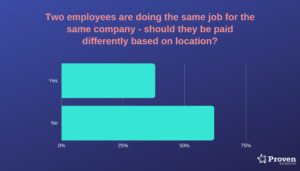
How much should you pay remote workers?
Two employees are doing the same job for the same company – should they be paid differently based on location?
Since the lockdowns, reactions have been all over the board; some companies are doubling down on “pay by location” while others lean into a remote future.
In a recent poll 62% of respondents said that remote employees should not be paid differently based on location. A clear preference, though not a landslide by any means; a full 38% made arguments to the contrary.

So how are companies compensating remote workers, and why?
First let’s take a look at one of the most influential companies in the world – Facebook. Their quickly-adopted remote pay policy weighs ‘location’ alongside such measures as productivity, output, seniority, special skillsets, etc. We can all understand the thinking behind this compensation structure – by tying pay to location, Facebook will presumably cut its costs as workers flee from overrun metropolises like San Francisco and New York City and settle in cheaper cost-of-living locales. Facebook is offering their workforce an ostensible benefit – remote work – at a high price.
But is this a good business decision?
The answer is…debatable. As the 3-year remote person writing this article (hello!) I am very much against such a policy. To me it makes little business sense to force a decision between quality of life and income, especially when moving out of big cities may actually make workers happier and more productive.
These policies don’t benefit the person and they certainly don’t benefit the business, which positions itself in opposition to its most valuable asset – its people.
Let’s look at another remote company: Zapier. Zapier has taken a fundamentally different approach, even pre-Covid. They offer their workers $10,000 to leave the Bay Area to “help improve [their] family’s standard of living.” Now ask yourself, if you’re a Software Engineer currently living in SF at the top of your field, would you be more likely to take an offer from Zapier or Facebook?
Location vs. compensation
“All work has a fixed value to the business.”
Nick Francis, Help Scout
To pretend otherwise is nonsensical. It was one thing to pay workers differently based on location when they were forced to work in a specific (expensive) location, thereby driving down supply and up demand. But now that location is not a prerequisite to the job, salary should be only based on contributions to the company, hard-to-find skills, and material output. It’s the same supply and demand calculations – except now ‘supply’ refers to the entirety of the nation, perhaps the world. Location, seniority, degrees – these just confound what should be a straightforward business assessment.
Now I am not claiming to be the final word on this argument; Proven Recruiting’s own Co-Founders have disagreed with me. Yet the evidence seems clear enough – paying workers commensurate with their work output (vs. their work location) will help your company hire and retain the best people. Of course from an individual contributor perspective, it’s a tradeoff. You’ll get added freedom, but you risk being replaced by someone equally or more skilled from across the state, country, or world. You can find arguments against remote work from a personal perspective here.
The company argument remains clear, though. As a leader at your company you’ve been gifted the opportunity to hire the most talented professionals, regardless of location. Let’s not squander this chance by paying these individuals anything but the top-of-market salary they’ve earned. Underpaying will only ensure that your top people will be poached by another more competitive company; a company that values material contributions over location. This Medium article does an excellent job at laying out the broader argument.
A final question; if you were working for Facebook and wanted to move out of SF, would you keep your remote job, or would you look for a company that measured your value based on your actual work?
Recent Posts

Ingram’s Insights: Tech’s Shortcomings & Q2 Hybrid/Remote Forecast
Listing technology’s shortcomings has become somewhat of a sport. According …
A recruiter’s secret to making career resolutions stick
The status quo is a temptress. It whispers sweet nothings …
Ingram’s Insights: 3 trends shaping hiring today
Co-Founder of Proven Recruiting Ingram Losner has always been our …


LinkedIn Twitter Facebook Yelp Google